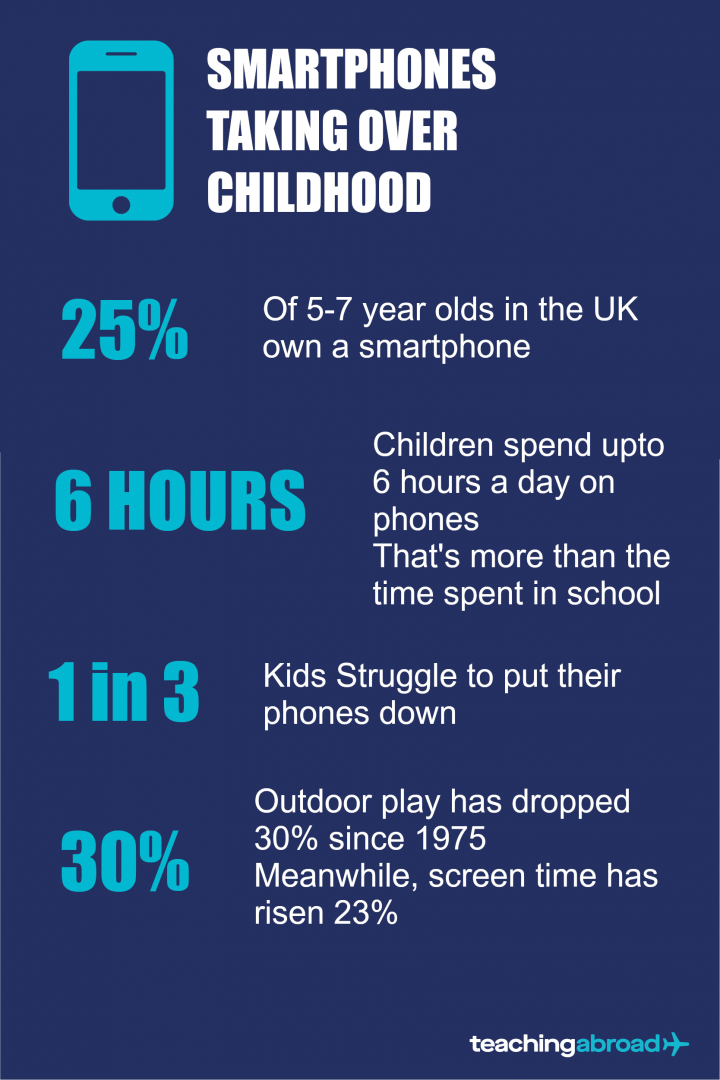Teaching Abroad Direct
Smartphones have become deeply embedded in modern life. Less than two decades ago, it would have been unimaginable that we could use our phones to order groceries, tap to pay in shops, navigate ourselves to a restaurant via Google maps or message all your friends at once through a Whatsapp group. The pace of technological advancement has been staggering, and there's no denying the convenience and efficiency smartphones have brought to our daily lives.
However, while the benefits of smartphones are evident, the dangers they pose, especially to children in schools, are becoming impossible to ignore.
Teaching Abroad Direct has taken a deep dive into the growing risks associated with smartphones in schools and examined the current pushback from parents and teachers in the UK looking to have smartphones banned from schools altogether.

Smartphones and the Developing Brain
It's a scientific fact that children's brains are still under development. The prefrontal cortex, responsible for emotional regulation and decision-making, isn’t fully developed until about age 25.
Yet, children have access to devices designed to hijack attention and deliver addictive dopamine hits. There is an argument that with the correct parental controls in place, harmful content can be avoided however there are two problems with this train of thought.
1) This does not take into account other children without parental controls in place sharing content with other students and,
2) Parental controls in many cases can be overridden through simple Google searches.
Most parents would not let a 5-year-old get lip fillers or a tattoo but are happy to provide them with full access to a device that can access adult content, gambling apps, and the dark web.
According to the Royal College of Psychiatrists (2024):
Teachers are overwhelmed. Children are overstimulated. Safeguarding policies are failing.
Childhood Is Shrinking
Life expectancy in the UK is approximately 81 years on average, and childhood makes up more than 20% of the average persons life. But since 2010, smartphones have invaded those crucial developmental years.
Psychologist Jonathan Haidt calls it the “rewiring of children.”
Scary Stats:
Political Failure, Real-World Harm
In March 2025, the “Safer Phones Bill” was watered down beyond recognition. Politicians (Keir Starmer) won’t commit to bans—even though daily safeguarding reports paint a terrifying picture:
And yet, phones are still allowed in many schools.
Banning Phones Boosts Performance
The benefits of banning smartphones are clear and have already been demonstrated by several UK schools that have done so.
Cyberbullying and Vanishing Childhoods
We’re raising a generation of children who don’t play outside—but can’t put their phones down.
Teachers Are on the Front Lines
Teaching in 2025? One NEU leader says it’s like being on a battlefield.
Removing smartphones from schools would restore focus, reduce mental health strain, and ease pressure on staff.
Yet many schools remain trapped in the promises of EdTech and AI, of which many tools are only useful if students have phones.
Parents and Teachers Are Fighting Back
Parents and teachers are seeing the problems and there are now several movements looking to push change forward.
Movements Gaining Momentum:
It’s Time to Ban Smartphones in Schools
There’s no sugar-coating it: Smartphones are adult devices, and children are not equipped to handle them.
Progress should not come at the cost of our children’s wellbeing.
Ban smartphones in schools. Not because we’re anti-technology - but because we’re pro-childhood.
Join the Conversation: